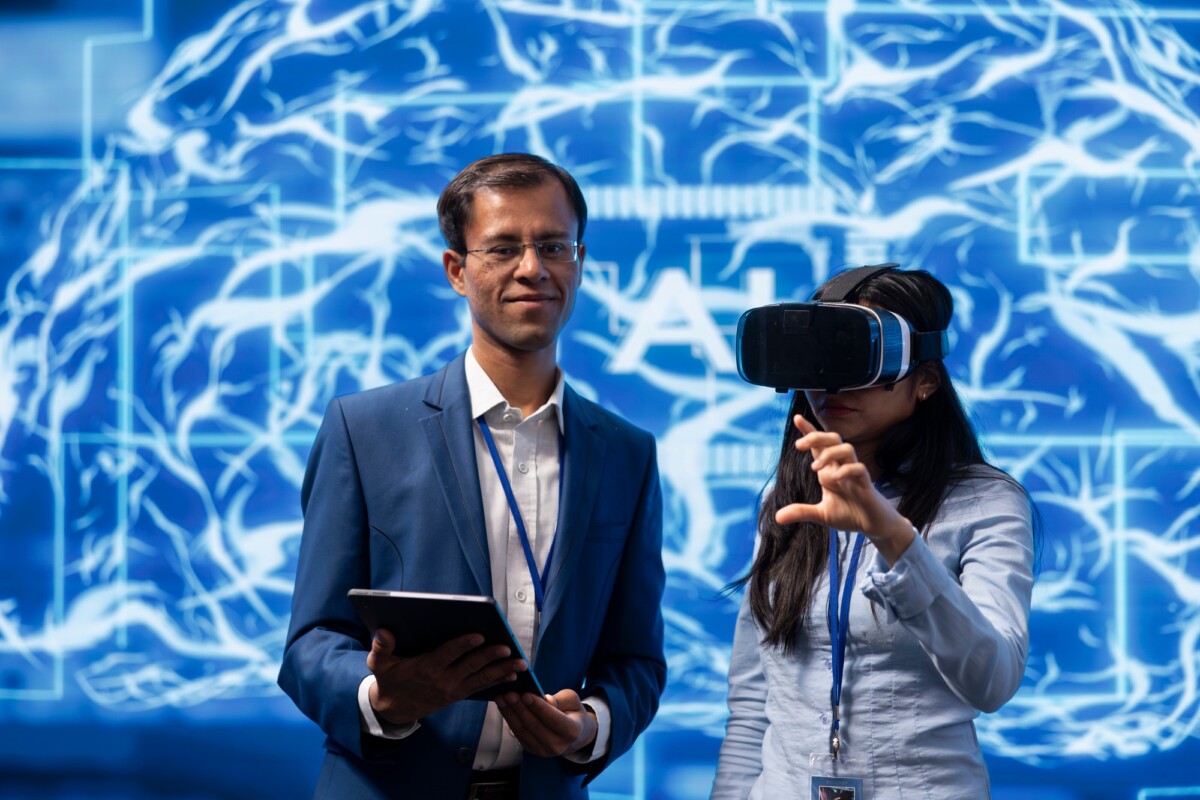
Understanding the ethical concerns surrounding AI is crucial as these technologies increasingly influence our daily lives. From privacy issues to biases in decision-making, the implications of AI and ethics are profound. As we navigate this complex landscape, it’s essential to consider how these technologies align with our moral values.
Key Ethical Concerns in AI
- Bias and Discrimination: AI systems can perpetuate existing biases, leading to unfair treatment in areas like hiring and law enforcement.
- Privacy Violations: The collection and analysis of personal data raise significant privacy concerns, especially in educational settings.
- Accountability: Determining who is responsible for AI decisions can be challenging, particularly when errors occur.
AI in Education: A Double-Edged Sword
The question, “Is it not allowed to use AI in school?” often arises. While AI can enhance learning, it also poses risks to academic integrity. Students must understand the balance between leveraging AI tools and maintaining their originality in work.
Upholding Academic Integrity
AI and academic integrity are intertwined. Educational institutions must establish clear guidelines on acceptable AI use to ensure that students engage with technology ethically. This balance is vital for fostering a culture of honesty and responsibility in learning environments.
Unlock your potential with online degrees—Learn more!
What Are the Risks of Bias in AI Systems?
As we delve into the realm of AI and ethics, it’s crucial to understand the ethical concerns surrounding artificial intelligence systems. One significant issue is the risk of bias, which can lead to unfair outcomes in various applications, from hiring practices to law enforcement. This bias often stems from the data used to train AI models, reflecting existing societal prejudices.
Understanding Bias in AI Systems
Bias in AI can manifest in several ways, including:
- Data Bias: When the training data is not representative of the broader population, it can skew results.
- Algorithmic Bias: The algorithms themselves may inadvertently favor certain groups over others, leading to discrimination.
- Human Bias: Developers’ unconscious biases can influence how AI systems are designed and implemented.
Implications of AI Bias
The implications of biased AI systems are profound. For instance, if AI tools are used in schools, questions arise about academic integrity. Is it not allowed to use AI in school if it perpetuates bias? Such concerns highlight the need for transparency and fairness in AI applications, especially in educational settings.
Addressing these ethical concerns is essential for fostering trust in AI technologies. By prioritizing AI and ethics, we can work towards creating systems that are not only efficient but also equitable, ensuring that all individuals are treated fairly regardless of their background.
How Does AI Impact Privacy and Surveillance?
As artificial intelligence (AI) continues to evolve, it brings forth significant ethical concerns that society must address. One of the most pressing issues is how AI impacts privacy and surveillance. With the ability to analyze vast amounts of data, AI systems can track individuals’ behaviors, leading to potential invasions of privacy. Understanding these implications is crucial in navigating the ethical landscape of AI.
Data Collection and Consent
AI technologies often rely on extensive data collection, raising questions about consent. Are users fully aware of how their data is being used? This lack of transparency can lead to ethical dilemmas, especially in educational settings. For instance, Is It Not Allowed to Use AI in School? raises concerns about student privacy and data security.
Surveillance and Monitoring
The integration of AI in surveillance systems can enhance security but also poses risks. The potential for misuse is high, as AI can be employed to monitor individuals without their knowledge. This leads to ethical questions surrounding AI and Ethics, particularly regarding the balance between safety and personal freedoms.
The Dilemma of Accountability in AI Decision-Making
The ethical concerns surrounding AI are increasingly significant as technology advances. Understanding these issues is crucial, especially when considering how AI impacts decision-making processes in various fields. One of the most pressing dilemmas is accountability in AI decision-making, which raises questions about responsibility and transparency.
Who is Responsible?
When AI systems make decisions, it can be unclear who is accountable for the outcomes. Is it the developers, the users, or the AI itself? This ambiguity complicates the ethical landscape, especially in critical areas like healthcare and law enforcement.
Impact on Academic Integrity
In educational settings, the question arises: Is it not allowed to use AI in school? Many institutions grapple with this issue, as AI tools can enhance learning but also pose risks to academic integrity. Ensuring that students engage with material authentically is vital for their development and ethical standards.
Transparency in AI Algorithms
Transparency is another ethical concern in AI. Many algorithms operate as ‘black boxes,’ making it difficult to understand how decisions are made. This lack of clarity can lead to mistrust and skepticism, particularly when AI impacts people’s lives significantly. Ensuring that AI systems are explainable is essential for fostering trust and accountability.
Bias and Fairness
AI systems can inadvertently perpetuate biases present in their training data. This raises ethical questions about fairness and discrimination. For instance, if an AI tool used in hiring processes favors certain demographics, it can lead to unequal opportunities. Addressing bias in AI is crucial to uphold ethical standards and promote equality.
The Role of AI in Education
As AI becomes more integrated into educational environments, the debate around AI and academic integrity intensifies. While AI can assist in research and learning, it also poses challenges regarding plagiarism and originality. Educators must find a balance between leveraging AI’s benefits and maintaining academic honesty.
Unlock your potential with online degrees—Learn more!
Can AI Be Trusted to Make Ethical Choices?
As artificial intelligence (AI) continues to evolve, the ethical concerns surrounding its use have become increasingly significant. Understanding these concerns is crucial, especially as AI systems are integrated into various aspects of our lives. From decision-making processes to educational tools, the question arises: Can AI be trusted to make ethical choices?
The Dilemma of AI and Ethics
AI and ethics intersect in complex ways. Algorithms can perpetuate biases if not carefully monitored, leading to unfair outcomes. This raises the question of accountability: who is responsible when AI makes a mistake? Ensuring ethical AI requires transparency and ongoing evaluation.
AI in Education: A Double-Edged Sword
The debate around AI in schools often centers on academic integrity. Is it not allowed to use AI in school? While AI can enhance learning, it also poses risks of misuse. Educators must navigate these challenges to maintain fairness and uphold standards.
Balancing Innovation and Ethics
As we embrace AI technology, balancing innovation with ethical considerations is vital. Developers must prioritize ethical frameworks to guide AI design, ensuring that systems are fair and just. This balance is crucial for fostering trust among users and stakeholders alike.
The Impact on Academic Integrity
AI and academic integrity are closely linked. The ease of access to AI tools can tempt students to bypass traditional learning methods. Educators must implement guidelines that encourage responsible use of AI, fostering a culture of integrity while leveraging its benefits for enhanced learning experiences.
Read Also: How Can AI Impact Academic Integrity? A Complete Guide
The Role of Regulation in Ensuring Ethical AI Practices
As AI technology continues to evolve, understanding the ethical concerns surrounding its use becomes increasingly crucial. The intersection of AI and ethics raises questions about accountability, bias, and the potential for misuse. This is particularly relevant in educational settings, where the integrity of learning is at stake.
Accountability in AI Development
- Developers must ensure transparency in AI algorithms.
- Clear guidelines can help mitigate biases in AI systems.
Addressing Misuse in Education
Is it not allowed to use AI in school? This question highlights the need for regulations that define acceptable AI use in academic environments. Schools must establish policies that promote AI and academic integrity, ensuring that students use AI tools responsibly and ethically.
Promoting Fairness and Equity
- Regulations should focus on preventing discrimination in AI applications.
- Ensuring equal access to AI resources can help bridge educational gaps.
In conclusion, the role of regulation is vital in navigating the ethical landscape of AI. By establishing clear guidelines, we can foster an environment where AI enhances education without compromising integrity or fairness.
How CollegeAndTuition.com Supports Ethical AI Development
The rise of artificial intelligence (AI) has sparked significant discussions around its ethical implications. As AI technologies become more integrated into our daily lives, understanding the ethical concerns surrounding AI is crucial. This awareness helps ensure that AI development aligns with societal values and promotes fairness, transparency, and accountability.
Commitment to AI and Ethics
At CollegeAndTuition.com, we prioritize ethical AI development by adhering to guidelines that promote responsible usage. We believe that AI should enhance human capabilities without compromising moral standards or privacy.
Addressing Academic Integrity
Many students wonder, “Is it not allowed to use AI in school?” The answer is nuanced. While AI can be a valuable educational tool, it must be used responsibly to maintain academic integrity. We advocate for clear policies that guide students on ethical AI usage in their studies.
Transparency in AI Processes
Transparency is key in AI development. At CollegeAndTuition.com, we strive to make our AI systems understandable and accessible. This includes clear communication about how AI algorithms work and the data they use, ensuring users can trust the technology they engage with.
Promoting Fairness and Inclusivity
AI systems can inadvertently perpetuate biases. We actively work to identify and mitigate these biases in our algorithms. By promoting fairness and inclusivity, we aim to create AI solutions that serve diverse populations equitably, aligning with our commitment to ethical standards.
Continuous Ethical Evaluation
Ethics in AI is not a one-time consideration. We regularly evaluate our AI practices to adapt to new challenges and societal expectations. This ongoing assessment helps us remain accountable and responsive to the ethical concerns that arise as technology evolves.
Unlock your potential with online degrees—Learn more!
FAQs
-
What is AI ethics?
AI ethics refers to the principles and guidelines that govern the responsible development, deployment, and use of artificial intelligence to ensure fairness, transparency, and accountability. -
Why is AI ethics important?
Ethical AI ensures that AI systems do not cause harm, discriminate, or invade privacy. It promotes fairness, accountability, and trust in AI technologies. -
What are the key ethical concerns in AI?
Some major concerns include bias and discrimination, privacy violations, lack of transparency, job displacement, and the misuse of AI for harmful purposes. -
How can AI be biased?
AI bias occurs when algorithms reflect human biases present in training data. This can lead to unfair decisions in hiring, lending, law enforcement, and more. -
What is algorithmic transparency?
Algorithmic transparency means making AI decision-making processes understandable and explainable to users, regulators, and stakeholders.





